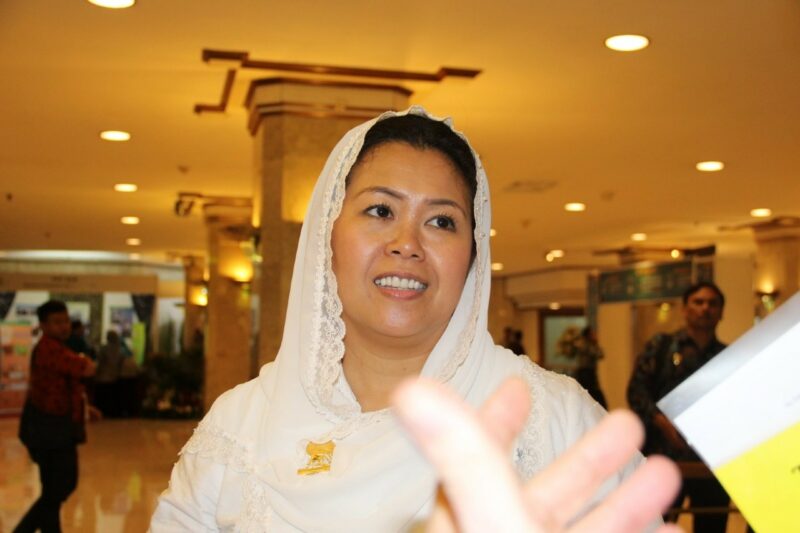Equality is risky - best stay with blokes
December 18, 2023
Indonesians have just witnessed a messy, badly produced TV ‘debate’ between the politicians jostling to run the world’s fourth largest democracy facing a national election in less than two months.
Just a few weeks ago it seemed Indonesian politics was edging towards modernity by recognising that half the voters are women with different values, needs and expectations.
Not to be. The oligarchs have spoken: In a nation that claims to be progressive and tolerant there’s no place for a woman in any leadership team The six candidates for the Presidency and Vice Presidency are men, all Javanese, all Muslim.
For a short but hopeful time in the juggling for positions, it seemed possible that a woman might get a go. Mid-year three ferociously ambitious mega-rich guys were seeking a partner for the 14 February poll. What date could be more auspicious for starting anew?
The paramours were lusting after a Vice President who could relate to those who’ve matured this century in a democracy, albeit flawed. Voting is voluntary. In the 2019 presidential election, the turnout was 82 per cent.
The obvious choice was Yenny Wahid, 49, and she was willing.
The second daughter of the Republic’s fourth president, the late Abdurrahman (Gus Dur) Wahid (1940 - 2009), had the professional and personal qualifications for high office, so who’d win her hand? It was the sinetron (soapie) spellbinding the nation.
The lady most likely headed a tiny socialist party with Buckley’s chance of scoring even a footstool in the 575-seat national parliament by going alone. She was being wooed for her qualities, ancestry and reputation for relating to the young.
When the Indonesian Army trashed East Timor after locals rejected Indonesian rule in the 1999 referendum, Yenny was a correspondent with the then Fairfax Press, a journo in the coverage team that won a Walkley Award, Australia’s highest prize in journalism.
(Use of forenames is Indonesian style. It doesn’t imply partiality.)
Now she heads the Wahid Institute, an Islamic think-tank working for ‘the development of both Indonesian as well as Islamic society, improving the welfare of lower classes … building democracy and fundamental justice, and expanding peace and non-violence.’
In 2009 the World Economic Forum named Yenny a young global leader. She has a Harvard master’s degree, a persuasive personality and international experience.
She’s a liberal Muslim with all the credentials. Her great-grandfather Hasyim Asy’ari founded the world’s largest Muslim organisation Nahdatul Ulama (NU) which claims close to 100 million members.
In Indonesian culture the way women dress and behave is scrutinised for signs of unorthodoxy; Yenny, a married Mum of three, came across as an Ibu Ibu, a safe homely matron, which doesn’t mean a soft touch.
In an earlier interview, she quashed suggestions of subservience: “This is the way I express my right to wear what I want. (She uses a half-jilbab headscarf.) It’s my symbol of struggle.
“It might be easier if I was a man in this macho society, but then the pressures could be physical rather than mental.”
Youngish voters will dominate the February ballot according to _The Jakarta Post:_ ”Around 114 million Indonesians eligible to vote next year are under 40.”
The _Kompas_ national newspaper commented: “Young people are always the target of the contestants’ votes (but) not many policies are in favour of the younger generation.”
The quinquennial election is the only time the ignored feel frisky. Indonesia’s teals have clustered around the centre-left Partai Solidaritas Indonesia (PSI) which includes Yenny’s politician husband Dhohir Farisi, and the socialist New Indonesian Nation Sovereignty Party (PKBIB) chaired by Yenny.
Both were formed this century by student Utopians after Reformasi - the 1998 fall of the autocrat General Soeharto who ran the nation for 32 years.
In the late 1700s, the French Revolution beheaded the ruling royalty to ensure they’d never return. In 1998 the Indonesian activists who brought down Soeharto naively assumed his cronies would disappear along with the king of the kleptocrats, all wreathed in shame.
The students were too soft, so last century’s oligarchs still rule and plunder, promise and default. A Macbethian tragedy wrote one academic. Another commented that Indonesia’s experiment with democracy has ‘been hijacked by the dark forces that held the country back before.’
Yenny’s problem shouldn’t have been gender, except among ultra-conservatives. The world’s most populous Muslim-majority nation had its first female president in 2001. As vice president Megawati Soekarnoputri inherited the job when Yenny’s father was impeached.
Even as coalitions, the small parties don’t have enough cash and candidates to steer the state, so their best chance of getting close to the driver is as VP.
The PSI nominated Yenny to stand with Ganjar Pranowo, 54, of Mega’s PDIP - the Indonesian Democratic Party of Struggle.
But Mega has no love for the Wahid family, so no-go. Likewise with disgraced general Prabowo Subianto, 72, Indonesia’s Donald Trump.
Insiders then predicted Yenny pairing with the former Jakarta Governor Dr Anies Baswedan, 54. The one-time Education Minister and University Rector has the skills needed to work with a smart female.
The US-educated Anies has been nominated by the secular centrist Partai NasDem (National Democrat) which has 59 seats in the current Parliament.
While Yenny’s swains thought she had the youth ratings, in the end, they feared her liberal values. So Prabowo selected outgoing President Joko (Jokowi) Widodo’s eldest son Gibran Rakabuming Raka, 36.
Ganjar Prabono (from Mega’s Democratic Party of Struggle - PDIP) went for former Constitutional Court justice Mohammad Mahfud Mahmodin while Anies picked Muhaimin Iskandar, the deputy house speaker but more importantly religiously close to Yenny’s late father through the NU Islamic organisation.
Though not so near as his daughter.


